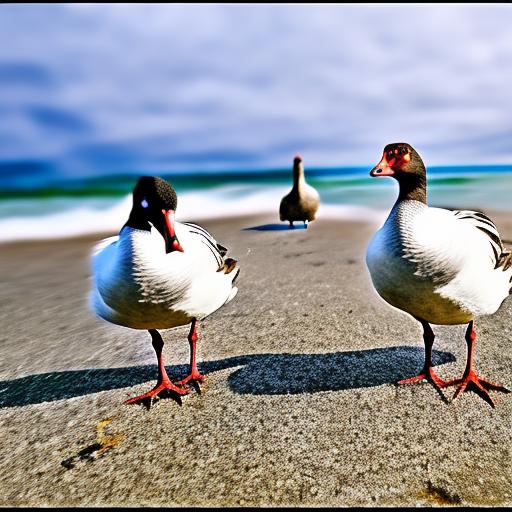Geese are a common sight on beaches, especially during certain times of the year. They are attracted to beaches because of the open space, access to water, and abundant food sources. Geese are known to be social birds and often gather in large flocks, making them a noticeable presence on the beach. Their droppings can create unsightly and unsanitary conditions, and their aggressive behavior towards beachgoers can be a cause for concern.
Geese are also known to be territorial and may become aggressive when they feel threatened. This can pose a risk to beach visitors, especially children and pets. Understanding the behavior of geese is crucial in developing effective strategies to manage their presence on the beach. By observing their habits and patterns, it becomes easier to identify the areas where they congregate and the times of day when they are most active. This information is essential for implementing targeted deterrent measures to discourage geese from frequenting the beach.
Key Takeaways
- Geese on the beach exhibit aggressive behavior and leave behind droppings, posing a nuisance to beachgoers.
- Planting tall grasses and shrubs can discourage geese from congregating on the beach.
- Fencing and netting can be installed to create physical barriers and prevent geese from accessing the beach area.
- Using sound machines and visual deterrents such as predator decoys can effectively scare off geese.
- Wildlife management companies can provide professional services for geese control, including habitat modification and population management.
Natural Deterrents: Using Plants and Landscaping to Discourage Geese
One effective way to discourage geese from congregating on the beach is by using natural deterrents such as plants and landscaping. Geese are attracted to open spaces where they can easily spot potential predators and access food sources. By strategically planting tall grasses, shrubs, and other vegetation, it becomes more challenging for geese to navigate the area and find suitable feeding grounds. Additionally, creating barriers with rocks or driftwood can further deter geese from accessing certain parts of the beach.
Landscaping can also be used to create visual barriers that disrupt the line of sight for geese, making them feel less secure and more exposed to potential threats. By incorporating natural elements such as dunes, berms, and other topographical features, it becomes easier to create a landscape that is less appealing to geese. These natural deterrents not only discourage geese from frequenting the beach but also contribute to the overall aesthetic and ecological value of the coastal environment.
Physical Barriers: Installing Fencing and Netting to Keep Geese Away
In addition to natural deterrents, physical barriers such as fencing and netting can be effective in keeping geese away from the beach. Fencing can be installed along the perimeter of the beach to create a clear boundary that prevents geese from accessing the area. The height and design of the fence should be carefully considered to ensure that it effectively deters geese without obstructing the views or access for beach visitors.
Netting can also be used to cover specific areas where geese tend to gather, such as picnic areas or playgrounds. The netting creates a barrier that prevents geese from landing and accessing these spaces, reducing the risk of encounters with beach visitors. When installing physical barriers, it is important to consider the impact on other wildlife and ensure that they do not pose any hazards or obstructions to native species or protected habitats.
Audio and Visual Deterrents: Using Sound and Visual Distractions to Scare Off Geese
Another approach to deterring geese from the beach is by using audio and visual deterrents that create a hostile environment for them. Geese are sensitive to loud noises and sudden movements, which can disrupt their sense of security and prompt them to leave the area. Devices such as sonic repellers or ultrasonic emitters can be used to emit high-frequency sounds that are unpleasant for geese, encouraging them to seek quieter and safer locations.
Visual deterrents such as predator decoys or reflective objects can also be effective in scaring off geese. The presence of decoys that resemble natural predators, such as coyotes or birds of prey, can create a sense of danger for geese, prompting them to avoid the area. Reflective objects such as tape or balloons can create visual disturbances that make geese feel uneasy and less inclined to stay on the beach. When using audio and visual deterrents, it is important to regularly change their location and patterns to prevent geese from becoming accustomed to them.
Professional Services: Hiring a Wildlife Management Company to Address the Issue
When dealing with persistent geese-related issues on the beach, it may be necessary to seek professional services from a wildlife management company. These companies specialize in developing comprehensive strategies for managing wildlife populations in urban and natural environments. They can conduct thorough assessments of the beach area, identify key factors contributing to the presence of geese, and implement targeted solutions to address the issue.
Wildlife management companies have access to a range of tools and techniques for managing geese, including habitat modification, population control measures, and ongoing monitoring and maintenance. They can also provide valuable expertise in navigating regulatory requirements and obtaining necessary permits for implementing geese management strategies. By enlisting the services of a professional wildlife management company, beach managers can ensure that they are taking a proactive and responsible approach to addressing geese-related concerns.
Community Involvement: Educating and Involving Residents in Geese Management

Community involvement is an essential component of effective geese management on the beach. By educating residents about the behavior of geese and the potential risks associated with their presence, it becomes easier to garner support for implementing deterrent measures. Community members can play an active role in reporting sightings of geese, monitoring their behavior, and participating in efforts to discourage them from frequenting the beach.
Involving residents in geese management can also foster a sense of ownership and responsibility for maintaining a safe and enjoyable beach environment. Community members can contribute ideas for implementing natural deterrents, organizing clean-up efforts, and promoting responsible behavior that minimizes interactions with geese. By fostering a sense of shared stewardship for the beach, it becomes possible to create a sustainable approach to managing geese that aligns with the values and priorities of the local community.
Legal Considerations: Understanding Local Regulations and Permits for Geese Control
When implementing geese management strategies on the beach, it is important to consider legal regulations and obtain necessary permits for controlling wildlife populations. Many jurisdictions have specific guidelines for managing geese populations, especially in areas where they may be protected under conservation laws. It is essential to consult with local wildlife authorities and obtain clear guidance on the permissible methods for deterring geese from the beach.
In some cases, obtaining permits for implementing certain deterrent measures may be required, such as using audio devices or conducting habitat modifications. It is important to adhere to these regulations and obtain the necessary approvals before proceeding with any geese management activities. By understanding and complying with legal considerations, beach managers can ensure that their efforts to address geese-related issues are conducted in a responsible and lawful manner.
In conclusion, managing geese on the beach requires a multifaceted approach that integrates natural deterrents, physical barriers, audio-visual distractions, professional services, community involvement, and legal considerations. By understanding the behavior of geese and implementing targeted strategies, it becomes possible to create a safe and enjoyable beach environment for residents and visitors alike. Through collaborative efforts and responsible stewardship, beach managers can effectively address geese-related concerns while preserving the ecological integrity of coastal habitats.
Looking for effective ways to keep geese off your beach? Check out this insightful article on PoultryWizard.com that offers valuable tips and strategies for managing geese and other poultry. Whether you’re dealing with geese, chickens, or turkeys, PoultryWizard has you covered with expert advice on creating a safe and peaceful environment. For more helpful poultry-related articles, visit PoultryWizard.com.
FAQs
What are some effective methods for keeping geese off your beach?
Some effective methods for keeping geese off your beach include using visual deterrents such as scarecrows or reflective tape, using auditory deterrents such as noise-making devices, and using physical barriers such as fencing or netting.
Are there any natural deterrents that can be used to keep geese off the beach?
Yes, there are natural deterrents that can be used to keep geese off the beach. These include planting tall grasses or shrubs along the shoreline to create a natural barrier, and using trained dogs to patrol the beach and deter geese from landing.
Is it legal to use certain methods to keep geese off the beach?
It is important to check with local authorities and wildlife agencies to ensure that any methods used to keep geese off the beach are legal and in compliance with local regulations. Some methods, such as using trained dogs, may require special permits or permissions.
What are the potential risks of having geese on the beach?
Having geese on the beach can pose several risks, including damage to vegetation, contamination of water with feces, and aggressive behavior towards beachgoers. Geese can also contribute to erosion of the shoreline through their feeding and nesting habits.
Are there any humane methods for keeping geese off the beach?
Yes, there are humane methods for keeping geese off the beach. These include using non-lethal deterrents such as visual and auditory deterrents, and creating natural barriers that discourage geese from landing on the beach. It is important to prioritize the well-being of the geese while also protecting the beach environment.
Meet Walter, the feathered-friend fanatic of Florida! Nestled in the sunshine state, Walter struts through life with his feathered companions, clucking his way to happiness. With a coop that’s fancier than a five-star hotel, he’s the Don Juan of the chicken world. When he’s not teaching his hens to do the cha-cha, you’ll find him in a heated debate with his prized rooster, Sir Clucks-a-Lot. Walter’s poultry passion is no yolk; he’s the sunny-side-up guy you never knew you needed in your flock of friends!







